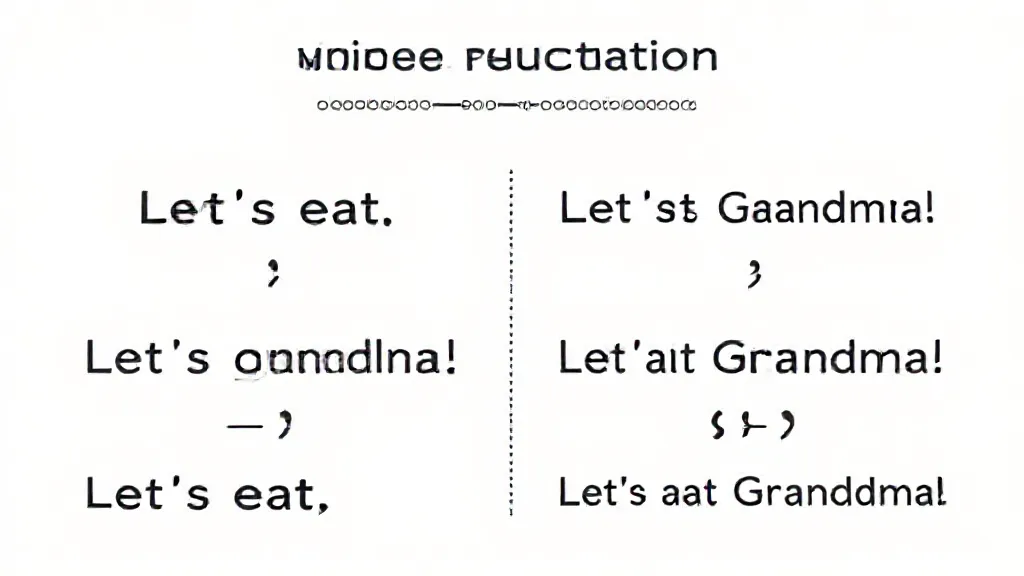Understanding the role of punctuation in written language is crucial for effective communication. Punctuation marks serve as vital tools that clarify meaning, indicate pauses, and convey emotions. A single misplaced comma or period can drastically alter the interpretation of a sentence, leading to confusion or miscommunication.
This article delves into how punctuation can change sentence meaning, providing examples and insights to enhance your understanding of this essential aspect of writing.
The Importance of Punctuation in Communication
Punctuation is not merely a set of arbitrary symbols; it is a structured system that guides readers through the text. Each punctuation mark has a specific function that contributes to the overall meaning of a sentence.
For instance, consider the difference between "Let's eat, Grandma!" and "Let's eat Grandma!" The first sentence invites Grandma to join in a meal, while the second implies a rather grim scenario. This example highlights how punctuation can alter the intended message and emphasizes the necessity of using punctuation correctly.
Common Punctuation Marks and Their Functions
The most common punctuation marks include the period, comma, question mark, exclamation mark, colon, and semicolon.
Each of these marks plays a distinct role in shaping sentence structure and meaning. The period signifies the end of a statement, while the comma indicates a pause or separation of ideas. The question mark transforms a statement into an inquiry, and the exclamation mark conveys strong emotion or urgency.
Understanding the specific functions of these marks can help writers construct clearer and more effective sentences.
How Misplaced Punctuation Can Lead to Misunderstandings
Misplaced punctuation can lead to significant misunderstandings. For example, the sentence "I love cooking my family and my dog" suggests a rather alarming culinary preference, while "I love cooking, my family, and my dog" clarifies that the speaker enjoys cooking and has both a family and a dog.
Such examples underscore the importance of punctuation in conveying accurate meaning and avoiding ambiguity.
The Role of Punctuation in Different Contexts
The impact of punctuation extends beyond simple sentence structure; it varies across different contexts and genres. In academic writing, precise punctuation is essential for clarity and credibility.
In creative writing, punctuation can create rhythm and emotional depth. For example, the use of ellipses can convey hesitation or suspense, while dashes can add emphasis or interruption. Writers must adapt their punctuation usage based on the context to effectively communicate their intended message.
Historical Evolution of Punctuation
The use of punctuation has evolved significantly over time. Ancient scripts often lacked punctuation, relying on context and word order to convey meaning. The introduction of punctuation marks began in the 3rd century BC with the Greeks, who used dots to indicate pauses.
The development of the modern punctuation system occurred during the Renaissance, leading to the standardized use of marks we recognize today. Understanding this historical context can provide insight into the significance of punctuation in contemporary writing.
Punctuation in Digital Communication
In the age of digital communication, punctuation continues to play a vital role, albeit in new forms.
The rise of texting and social media has led to the development of new punctuation conventions, such as the use of emojis and abbreviations. However, traditional punctuation remains essential for clarity in more formal communication. The challenge lies in balancing the casual nature of digital interactions with the need for clear and effective communication.
Practical Tips for Effective Punctuation
To enhance your punctuation skills, consider the following practical tips: always proofread your writing for punctuation errors, familiarize yourself with the rules governing each punctuation mark, and read your sentences aloud to gauge their clarity. Additionally, studying well-punctuated texts can provide valuable examples of effective punctuation usage. By practicing these skills, you can improve your writing and ensure that your intended meaning is conveyed accurately.
Conclusion: The Power of Punctuation in Writing
In conclusion, punctuation is a powerful tool that can significantly influence sentence meaning. By understanding the functions of various punctuation marks and their impact on communication, writers can enhance their clarity and effectiveness. As language continues to evolve, so too will the conventions of punctuation, making it essential for writers to stay informed and adaptable.
Embracing the nuances of punctuation will ultimately lead to more precise and impactful writing.
